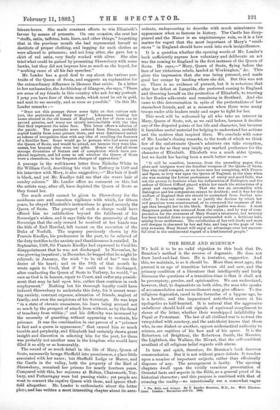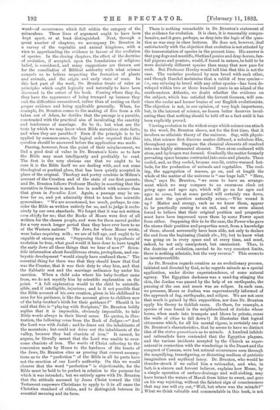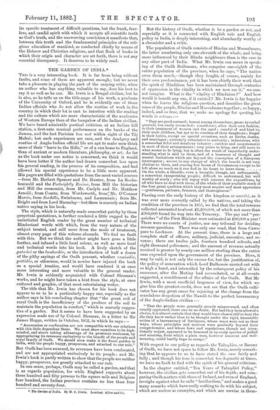THE BIBLE AND SCIENCE.*
WE hold it to be no valid objection to this book that Dr.. Brunton's method is the reverse of dogmatic. He does not-
draw hard-and-fast lines. He is tentative, suggestive. And this, we maintain, is as it should be. More than moat ages, the present is an age of transition between old and uew, and the- primary condition of a literature that intelligently and fairly discusses the questions of a transition-time is that it shall not be peremptory, precise, and opinionative. We can anderstrind, however, that, to dogmatists on both sides, the man who speaks of accommodation and reconcilement may give offence. To the religions dogmatist, cased in the formulas of a bygone age, he- is a heretic, and the impassioned anti-theist sneers at his apologetics as half-hearted. It is natural that the aggressive unbeliever should hold out signals of equivocal compliment to slaves of the letter, whether their worshipped infallibility be Papal or Protestant. The law of all civilised war is to treat the vanquished with courtesy, and the anti-theist knows that those who, in one dialect or another, oppose ecclesiastical authority to science, are captives of his bow and of his spear. It is the Robertson (of Brighton), the Robertson Smith, the Maurice, the Lightfoot, the Wallace, the Mivart, that the self-confident assailant of all religious belief regards with alarm.
In tone and spirit, therefore, Dr. Brunton's book deserves commendation. But it is not without grave defects. It touches upon a number of important subjects, rather than effectually disposes of any. The arrangement is faulty. The opening- chapters dwell upon the vividly veracious presentation of Oriental facts and aspects in the Bible, as a general proof of its historical character ; and this purpose is combined with that of evincing the reality—we intentionally use a somewhat vague • Ths BR& and &isnot. By T. Lander Brunton, M.D., Are. With Illostrai- 'Lions. London : Macmillan sad W. 1038. word—of occurrences which fall within the category of the miraculous. These lines of argument ought to have been 'kept apart, or at least distinguished. Next, through a great number of chapters, we accompany Dr. Brunton in a survey of the vegetable and animal kingdoms, with a view to apprehending the evidence in favour of the evolution of species. In the closing chapters, the effect of the doctrine of evolution, if accepted, upon the foundations of religious belief, is considered, and many suggestions are thrown out for the conciliation of Biblical authority with what science compels us to believe respecting the formation of plants and animals, and the origin and early state of man. In this last part of the work, Dr. Brunton treats of rules or principles which ought logically and naturally to have been discussed in the outset of his book. Coming where they do, they have the appearance of being trumped up because they suit the difficulties encountered, rather than of resting on their proper evidence and being applicable generally. When, for example, Dr. Brunton comes to the making of Eve from a rib taken out of Adam, he decides that the passage is a parable, constructed with the practical aim of inculcating the sanctity and tenderness of marriage. So be it ; but what are the tests by which we may know when Bible narratives state facts, and when they are parables ? Even if the principle is to be applied by common-sense, the logical order required that this -question should be answered before the application was made.
Passing, however, from the point of their misplacement, we ;fnd a good deal of value in Dr. Brunton's hints as to how the Bible may most intelligently and profitably be read. The first is the very obvious one that we ought to be -sure it is the Bible itself we are dealing with, and not some 'theological or poetical gloss, that has been quietly accepted in place of the original. Theology and poetry combine in-Milton's account of the Creation and of the state of our first parents, and Dr. Brunton follows Professor Huxley in asserting that the narrative in Genesis is much less in conflict with science than that given in Paradise Lost. Again, a passage may be un- true for us, and yet admirably fitted to teach less scientific generations. " We are accustomed, too much, perhaps, to con- sider the Bible as written entirely for us, and to judge it exclu- sively by our own standards. We forget that it was not written t;ers, chiefly for us ; that the Books of Moses were first of all written for the chosen people, and were for them sacred guides for a very much longer period than they have ever been to us of the Western nations." The Jews, for whom Moses wrote, were babes requiring milk ; we are of full age, and ought to be capable of strong meat. "Supposing that the hypothesis of evolution be true, what good would it have done to have taught the early Jews all these things that we hear of now ?" Scien- tific information about fossiliferous strata, protoplasm, and em- bryotic development "would simply have confused them." The essential thing for them was that they should know that God -was the Creator, that it was their duty to obey him, and that the Sabbatic rest and the marriage ordinance lay under his sanction. When a child asks where his baby-brother came from, we do not mystify him by scientific explanation on the point. "A full explanation would to the child be unintelli- gible, and if intelligible, injurious; and is it not possible that the Bible account of his own creation, given in his childhood to man for his guidance, is like the account given to children now of the baby-brother's birth for their guidance P" Should it be said that this is "playing with Scripture," Dr. Brunton boldly replies that it is impassible, obviously impossible, to take Bible words always in their literal sense. He quotes, in illus- tration, the following verse from the Book of Judges :—" And the Lord was with Judah ; and he drave out the inhabitants of the mountain; but could not drive out the inhabitants of the valley, because they had chariots of iron." It cannot, he argues, be literally meant that the Lord was unable to over- come chariots of iron. The words of Christ referring to the concession made by Moses to the hardness of the hearts of the Jews, Dr. Brunton cites as proving that current assump- tions as to the " perfection " of the Bible in all its parts have not the sanction of our Lord's authority. On this we would observe that the word " perfection " is objectionable, for the Bible must be held to be perfect in relation to the purpose for which it was intended ; but we entirely agree with Dr. Brunton that the attitude assumed by Jesus Christ toward the Old Testament empowers Christians to apply to it in all cases the Christian standard of ethics, and to distinguish between its essential meaning and its form. There is nothing remarkable in Dr. Brunton's statement of the evidence for evolution. It is clear, it is reasonably compre- hensive, and it goes, perhaps, as deep into the logic of the ques- tion as was easy in class lectures. He does not, however, deal satisfactorily with the objection that evolution is not attested by the transmutation of species in the present time. His answer is that pug dogs and mastiffs, Shetland ponies and dray-horses, fan- tail pigeons and pouters, would, if found in nature, be held to be more decisively different species than many that now pass for such. But Professor Huxley would tell him that this is not the case. The varieties produced by man breed with each other, and though Haeckel maintains that a rabbit of true species- i.e., one refusing to breed with any other species—has been de- veloped within two or three hundred years in an island of the south-eastern Atlantic, we doubt whether the evidence on the subject, which has satisfied -the fervent German, will con- vince the cooler and keener brains of our English evolutionists. The objection is not, in our opinion, of very high importance, but, in the interest of science, no lesson better deserves incul- cating than that nothing should be told off as a fact until it has been explicitly proved.
Viewing evolution in the widest scope which science can attach to the word, Dr. Brunton shows, not for the first time, that it involves no atheistic theory of the universe. Say, with physic- ists, that science first discerns matter diffused, a nebulous film, throughout space. Suppose the chemical elements all resolved into one highly attenuated element. Then. atom coalesced with atom, and hydrogen was formed. Gradually the matter formerly pervading space became contracted into suns and planets. These cooled, and, as they cooled, became sun-lit, centre-warmed hot- beds, for the production of animals and vegetables. The cool- ing, the aggregation of masses, go on, and at length the whole of the matter of the universe is " one huge ball." "Here, then," says Dr. Brunton, " we seem to have an arrange- ment which we may compare to an enormous clock set going ages and ages ago, which will go on for ages and ages to come, but at some period will certainly run down. And now the question naturally arises,—Who wound it up P Matter and energy, such as we know them, appear to be practically coming to an end, and we seem almost forced to believe that their original position and properties must have been impressed upon them by some Power apart from either. Supposing this to be the case, the Power who gave the atoms their position and properties must, from a knowledge of these, almost necessarily have been able, not only to declare the end from the beginning (Isaiah xlv., 10), but to know what was going on in every space and at every time, and must, indeed, be not only omnipotent, but omniscient. Thus, in the doctrine of evolution, carried to its very remotest limits, there is nothing atheistic, but the very reverse." This seems to us incontrovertible.
As Dr. Branton regards creation as an evolutionary process, initiated and directed by God, so he regards miracle as a special application, under divine superintendence, of some natural agency. The Egyptian darkness was a sand-fog stinging the skin, the Jordan was passed by the help of an earthquake, the pausing of the sun and moon was an eclipse. In each case, we presume, Moses or Joshua was supernaturally informed of the approach of fog, earthquake, and eclipse. We are not sure that much is gained by this supposition, nor does Dr. Brunton apply his theory to ticklish cases. (Is there, for example, a species of ram found in the neighbourhood of Jericho whose horns, when made into trumpets and blown by priests, cause the walls of cities to fall down ?) It illustrates that logical obtuseness which, for all his mental vigour, is certainly one of Dr. Brunton's characteristics, that he seems to have no distinct idea of the status quaestionis as to miracle. A hundred infidels and rationalists have contended that the Egyptian plagues, and the various incidents accepted by the Church as super- natural in connection with the wanderings in the Desert and the conquest of Canaan, were but natural occurrences seen through the magnifying, transfiguring, or distorting medium of patriotic imagination and mythical fancy. Dr. Brunton, who would be thunder-struck if we called him a rationalist, and who, in fact, is a sincere and fervent believer, explains how Moses, by a simple operation of surface-drainage and well•sinking, may have turned the waters of Marah from bitter to sweet, and goes on his way rejoicing, without the faintest sign of consciousness that any one will cry out," Well, but where was the miracle?" What we think valuable and commendable in this book, is not
its specific treatment of difficult questions, but the frank, fear- less, and candid spirit with which it accepts all scientific truth as God's truth, and the unswerving conviction it manifests that, between this troth and the fundamental principles of the reli- gious education of mankind, as conducted chiefly by means of the Hebrew and Christian religions, and that Book of books in which their origin and character are set forth, there is not any 'essential discrepancy. It deserves to be widely read.
















































 Previous page
Previous page